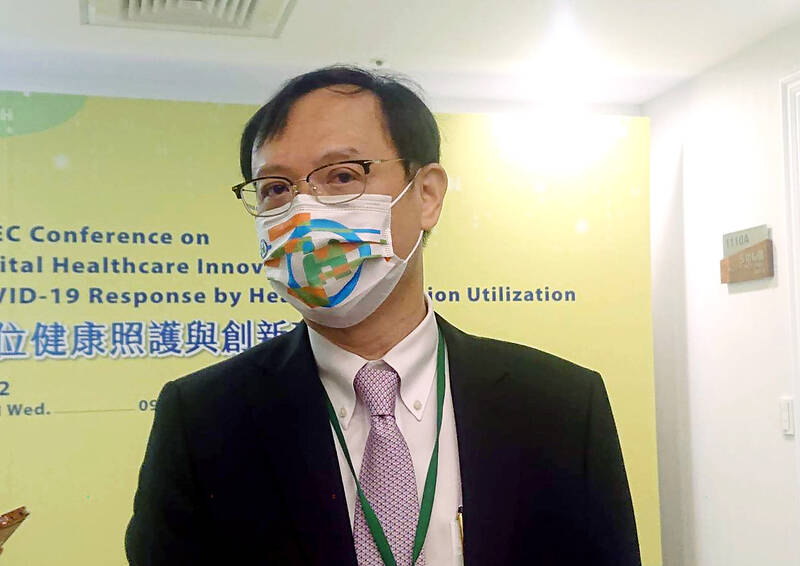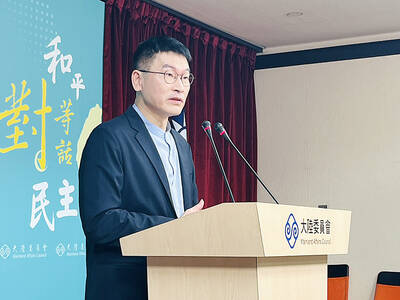The APEC Conference on Digital Healthcare Innovation opened in Taipei yesterday, with representatives from 12 of the 21 APEC member economies expected to take part in the two-day event being held by the National Health Insurance Administration (NHIA).
The agency has received US$75,000 from APEC to host the conference.
The conference is themed “COVID-19 Response by Health Information Utilization,” and features lectures, panel discussions and poster sessions. Some foreign participants would also visit Taipei Medical University Hospital today.

Photo: CNA
The event’s four main topics are: Digital transformation of healthcare and related innovations during the pandemic; new health policies and challenges in the post-pandemic era; telehealth and the future for hospitals; and bringing artificial intelligence to healthcare.
NHIA Director-General Lee Po-chang (李伯璋) at a dinner on Tuesday said that about 600 people had registered to attend the conference in person or online, including 278 people who would be participating in Taipei.
It is the first in-person large-scale international conference held by the Ministry of Health and Welfare since the COVID-19 pandemic began, the NHIA said.
“The conference is a useful platform for us to share our experiences promoting digital healthcare in Taiwan and to exchange ideas with the international community,” Lee said.
The NHIA last month launched a book titled Digital Health Care in Taiwan — Innovations of National Health Insurance, published by Springer Publishing, he said.
It is the first English-language book introducing the National Health Insurance (NHI) system in depth, including its history, income strategy, payment structure, policies, medical information system and other aspects, he added.
The book is available in physical and open-access electronic form, which has been downloaded more than 47,000 times since its launch, he said.
The NHI system involves a comprehensive database that has accumulated more than 70 billion medical records and more than 3.4 million medical images collected from Taiwan’s population, the NHIA said.
Providing parts of the anonymized data for research purposes has greatly benefited Taiwan’s healthcare policies and technology innovation, it said, adding that the data were also used for COVID-19 prevention.
“Digital technology facilitates the fast transmission and integrated use of healthcare data, bringing new prospect to smart healthcare,” Lee said. “Through international cooperation, we wish to discuss how we can better utilize big data to improve people’s health and welfare.”
“As this could also create business opportunities, it also meets APEC’s goal of supporting economic growth and prosperity in the region,” he said.
Healthcare providers and the public had been unfamiliar with telehealth, but that rapidly changed during the pandemic, as many people were diagnosed with COVID-19 and were prescribed antiviral drugs through telemedicine, he said.
Deputy Minister of Health and Welfare Shih Chung-liang (石崇良) told reporters on the sidelines of the conference that the Department of Medical Affairs has proposed revising the Rules of Medical Diagnosis and Treatment by Telecommunications (通訊診察治療辦法).
The revision plans to expand eligibility for receiving a prescription through telemedicine, Shih said.
Eligibility would be expanded from five categories of patients to 10, he said.
The new categories are people with chronic diseases in a steady condition; people in hospice care and long-term care residents; social welfare recipients; inmates; and people in need of urgent care, such as for COVID-19 or other infectious diseases, Shih said.
The draft revision might be presented next month and promulgated in December to take effect on Jan. 1 next year, he said.
The revision was proposed in light of the public’s increased familiarity with telemedicine and improvements in infrastructure, Shih said, adding that more than 98 percent of recent COVID-19 cases received healthcare through telemedicine.
If the revision is passed, the NHIA would upgrade the NHI system, including by promoting its digital NHI card and establishing an online NHI co-payment system, to make telemedicine more convenient for healthcare providers and patients, Lee said.

LOW RISK: Most nations do not extradite people accused of political crimes, and the UN says extradition can only happen if the act is a crime in both countries, an official said China yesterday issued wanted notices for two Taiwanese influencers, accusing them of committing “separatist acts” by criticizing Beijing, amid broadening concerns over China’s state-directed transnational repression. The Quanzhou Public Security Bureau in a notice posted online said police are offering a reward of up to 25,000 yuan (US$3,523) for information that could contribute to the investigation or apprehension of pro-Taiwanese independence YouTuber Wen Tzu-yu (溫子渝),who is known as Pa Chiung (八炯) online, and rapper Chen Po-yuan (陳柏源). Wen and Chen are suspected of spreading content that supported secession from China, slandered Chinese policies that benefit Taiwanese and discrimination against Chinese spouses of

ALIGNED THINKING: Taiwan and Japan have a mutual interest in trade, culture and engineering, and can work together for stability, Cho Jung-tai said Taiwan and Japan are two like-minded countries willing to work together to form a “safety barrier” in the Indo-Pacific region, Premier Cho Jung-tai (卓榮泰) yesterday said at the opening ceremony of the 35th Taiwan-Japan Modern Engineering and Technology Symposium in Taipei. Taiwan and Japan are close geographically and closer emotionally, he added. Citing the overflowing of a barrier lake in the Mataian River (馬太鞍溪) in September, Cho said the submersible water level sensors given by Japan during the disaster helped Taiwan monitor the lake’s water levels more accurately. Japan also provided a lot of vaccines early in the outbreak of the COVID-19 pandemic,

PROMOTION: Travelers who want a free stopover must book their flights with designated travel agents, such as Lion Travel, Holiday Tours, Cola Tour and Life Tours Air Canada yesterday said it is offering Taiwanese travelers who are headed to North America free stopovers if they transit though airports in Japan and South Korea. The promotion was launched in response to a potential rise in demand for flights to North America in June and July next year, when the US, Canada and Mexico are scheduled to jointly host the FIFA World Cup, Air Canada said. Air Canada offers services to 13 of the 16 host cities of the tournament’s soccer games, including Toronto and Vancouver; Mexico City, Guadalajara and Monterrey in Mexico; Atlanta, Georgia; Boston; Dallas; Houston;

The US approved the possible sale to Taiwan of fighter jet spare and repair parts for US$330 million, the Pentagon said late yesterday, marking the first such potential transaction since US President Donald Trump took office in January. "The proposed sale will improve the recipient's capability to meet current and future threats by maintaining the operational readiness of the recipient's fleet of F-16, C-130," and other aircraft, the Pentagon said in a statement. Trump previously said that Chinese President Xi Jinping (習近平) has told him he would not invade Taiwan while the Republican leader is in office. The announcement of the possible arms